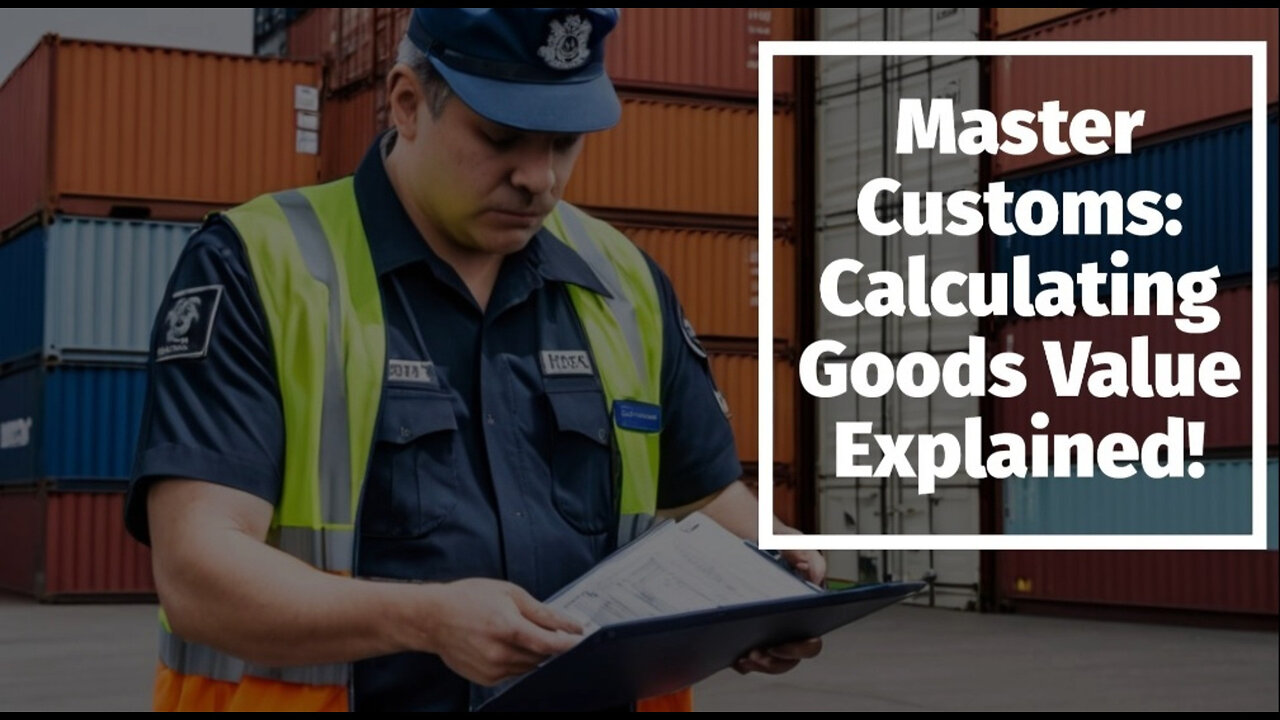Premium Only Content

Mastering Customs Brokerage: Valuing Goods, Bonds and ISF Filings
* e-Customs Clearing
* 714-855-3556
* info@eCustomsClearing.com
* https://ecustomsclearing.com
In this video, we provided an overview of how to calculate the value of goods for customs purposes, which is a critical aspect of customs brokerage. We discussed the steps involved in determining the transaction value, including the additional costs and expenses that should be included in the calculation.
We also highlighted the deductive elements that should be subtracted from the transaction value and explained the formula for calculating the customs value, which incorporates adjustments and deductions.
Additionally, we mentioned alternative methods of valuation that can be used if the transaction value is not applicable or if there are doubts about its accuracy.
Moving on, we briefly touched on the importance of customs bonds in ensuring the payment of customs duties and fees. We explained that customs bonds are required by customs authorities in many countries and can be obtained from surety companies.
Finally, we discussed the Importer Security Filing (ISF) requirement enforced by US Customs and Border Protection. We emphasized the importance of accurately filing ISF to avoid penalties and delays in cargo clearance, and the need to submit the filings at least 24 hours before loading the goods onto a vessel.
In conclusion, understanding how to calculate the value of goods, obtaining customs bonds, and filing Importer Security Filings are crucial components of customs brokerage in international trade. By following the correct methods and working with experienced customs brokers, importers can ensure compliance with regulations and facilitate efficient customs clearance.
#usimportbond #isfcustomsbroker #uscustomsclearing #isfentry
Video Disclaimer Here: This educational video is not linked to any US government entity.
0:31 - Calculating the value of goods for customs purposes is crucial for compliance with international trade regulations.
00:58 - The primary method used for valuation is the transaction value, which includes the price paid for the goods and additional costs incurred in transportation, loading, and insurance.
1:22 - Adjustments and deductions must be made to the transaction value to arrive at the customs value using the formula: Customs Value = Transaction Value + Adjustments + Deductions.
1:47 - Alternative methods may be used if the transaction value cannot be determined, and customs bonds and Importer Security Filings are important aspects of customs brokerage in international trade.
-
 LIVE
LIVE
Wendy Bell Radio
4 hours agoLet's Make A Deal
10,780 watching -
 LIVE
LIVE
AP4Liberty
1 hour ago $0.57 earnedElon Musk's Foray into Comedy: Public Reacts
415 watching -
 2:39:16
2:39:16
TimcastIRL
13 hours agoDemocrat CAUGHT ON TAPE ADMITTING To Corruption, CHEATING ON WIFE Says Nick Sortor | Timcast IRL
243K96 -
 1:02:08
1:02:08
Man in America
19 hours agoTrump to BAN the COVID Vaxx?! mRNA in Your Organic Meat?! w/ Kim Bright
111K86 -
 57:42
57:42
Flyover Conservatives
1 day agoThe Great Gold Cover-Up: Is Fort Knox EMPTY?! - Clay Clark + Dr. Kirk Elliott | FOC Show
76.4K24 -
 1:24:40
1:24:40
Kim Iversen
16 hours agoJeffrey Sachs Just Exposed the Truth They Don’t Want You to Hear
94.4K111 -
 2:11:32
2:11:32
Glenn Greenwald
14 hours agoGlenn From Moscow: Russia Reacts to Trump; Michael Tracey Debates Ukraine War | SYSTEM UPDATE #413
231K115 -
 2:19:23
2:19:23
Slightly Offensive
14 hours ago $17.95 earnedGOV. RAMASWAMY? Vivek to import 1 BILLION INDIANS to OHIO | Nightly Offensive
118K70 -
 4:51:08
4:51:08
Wahzdee
18 hours agoSniper Elite Then Extraction Games—No Rage Challenge! 🎮🔥 - Tuesday Solos
127K6 -
 2:12:58
2:12:58
Robert Gouveia
17 hours agoSenator's Wife EXPOSED! Special Counsel ATTACKS; AP News BLOWN OUT
132K81